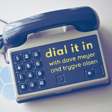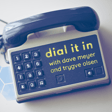
S2 Ep8 Finding Purpose and Overcoming Compassion Fatigue_ A Conversation with Juliet Watt
In this episode of Dial It In, hosts Dave Meyer and Trygve Olsen sit down with Juliet Watt, an inspiring author, TED Talk speaker, and compassion fatigue advocate. Juliet shares her incredible life journey, from being a former Playboy Bunny to becoming an expert in compassion fatigue. They discuss the concept of compassion fatigue and its relevance in today's world, where people often hold differing beliefs and are constantly stressed and guarded. Tune in to gain insights on how to navigate compassion fatigue and find ways to grow your business amidst the challenges of the modern world. Don't miss Juliet's book, "In Between the Magic, My Life from the Playboy Club to Beirut and Beyond," available on Amazon.
…
Dial It In Podcast is where we gathered our favorite people together to share their advice on how to drive revenue, through storytelling and without the boring sales jargon. Our primary focus is marketing and sales for manufacturing and B2B service businesses, but we’ll cover topics across the entire spectrum of business. This isn’t a deep, naval-gazing show… we like to have lively chats that are fun, and full of useful insights. Brought to you by BizzyWeb.
Links:
Website: dialitinpodcast.com
BizzyWeb site: bizzyweb.com
Connect with Dave Meyer
Connect with Trygve Olsen

